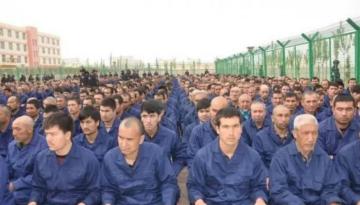Thousands of leaked police photos have emerged from China's Xinjiang province, shedding light on the secretive detention camps where more than one million Uyghurs and other Muslim minorities are believed to be detained.
The Xinjiang Police Files, passed onto and verified by the BBC, are providing insight into the internment of the region's Uyghurs and call into question China's claims about the camps.

The Chinese Government has claimed the camps, which have been expanded across Xinjiang since 2017, are voluntary schools for vocational education and counter-terrorism operations.
But the newly leaked information exposes the inner workings going on behind closed doors.
The BBC said the data trove provides some of the strongest evidence to date of a policy that targets almost any expression of Uyghur identity, culture or Islamic faith to assert control, with a shoot to kill policy for those who try to escape.
The leaked files contain more than 5000 police photographs of Uyghurs taken between January and July 2018. At least 2884 of them are mugshots of detainees ranging from 15 to 73 years old. People are placed in the camps for minor crimes such as praying or downloading messaging apps.

The photos showed police restraining shackled inmates with batons and what appears to be indoctrination sessions.

The files also include a 2017 speech by former Communist Party secretary in Xinjiang Chen Quanguo which called for officials to "exercise firm control over religious believers".

What has been reported
In 2018, satellite imagery showed rapid growth in 28 camps across the Xinjiang province, with over two million new square metres added since the beginning of 2017. The UK Government confirmed a large number of the Muslim population from the province have been detained or forced to enter these camps.
Experts estimate that Xinjiang reeducation efforts started in 2014, but were drastically expanded in 2017.

In 2019, hundreds of leaked files called the "China Cables" showed many aspects of the detainees' lives are controlled including when they are allowed to go to the toilet.
Students are forced to learn Mandarin, and every corner of their dorms and classrooms is under video surveillance.
They're only eligible for release once they've completely transformed their beliefs and speak Mandarin.
Former detainees have spoken of torture, rape and brainwashing at the camps in the country's west, with the Government wanting to force the prisoners to reject their faith and customs.
China's response
China has consistently denied the accusations.
The BBC approached the Chinese Government for comment on the recent findings, but they did not respond to the specific evidence in the cache.
"Xinjiang related issues are in essence about countering violent terrorism, radicalisation and separatism, not about human rights or religion," the Chinese Embassy in Washington DC responded.
They said that the Chinese authorities had taken "a host of decisive, robust and effective deradicalisation measures".
"The region now enjoys social stability and harmony as well as economic development," it went on, saying that these things offer "the most powerful response to all sorts of lies and disinformation on Xinjiang".
China's ambassador to the UK, Zheng Zeguang, dismissed the leaked documents as lies.
"Such a shame for BBC to carry the fabricated story about so-called 'detention camps”'.
Pathetic for the media, in cahoots with the notorious rumour monger, to once again spread disinformation about Xinjiang. Your smearing campaign will never obstruct China from progress!" He tweeted.
Western response
Western states and rights groups accuse Xinjiang authorities of detaining and torturing Uyghurs and other minorities in camps, with the US labelling it "genocide".
The US has slammed the United Nations High Commissioner for Human Rights Michelle Bachelet's trip to China, including Xinjiang, amid concerns that government restrictions on her access could undermine scrutiny of Beijing's rights record.
"We have no expectation that the PRC (People's Republic of China) will grant the necessary access required to conduct a complete, unmanipulated assessment of the human rights environment in Xinjiang," State Department spokesman Ned Price told a regular news briefing.
"We think it was a mistake to agree to a visit under the circumstances."
Germany is changing the way it deals with China and will give higher priority for human rights issues, Economy Minister Robert Habeck said on Tuesday, following the fresh media reports about human rights violations in the Xinjiang Uyghur Autonomous Region.
"It has long been clear that while China is a major trading partner, there are very relevant problems, including when it comes to respecting human rights," Habeck said in a statement.
New Zealand, along with 21 countries including Japan, Australia, Canada and the UK, issued a joint statement in July 2019 condemning the Xinjiang detention centres.
Newshub/Reuters


